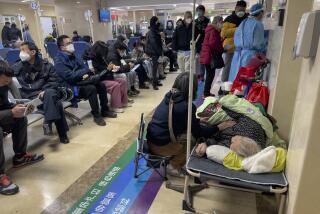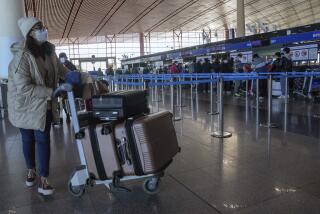China boasts of ‘people’s war’ against coronavirus. But Wuhan residents see shoddy propaganda
- Share via
BEIJING — It’s a classic Chinese campaign, harking back to Chairman Mao’s methods of inspiring patriotism and mobilizing the masses: Bright red banners and posters with large characters quoting the state leader’s slogans adorn every neighborhood.
Communist Party workers march through villages against a deadly enemy, banging gongs and shouting orders dictating every individual’s behavior. They strap on red armbands and go door-to-door — promising, in some cases, financial rewards for neighbors who snitch on those who break the rules and, in other cases, threatening to punish those who resist.
The war cry of the moment: “Take in all who should be taken in! Don’t miss a single person!”
Beijing has mobilized a nationwide “people’s war” against the novel coronavirus epidemic that has infected more than 45,000 people globally and killed more than 1,100.
The numbers indicate the toll is rising and the war is spreading. But China has proceeded with a campaign that’s all too familiar: Central leaders set a target and deadline with catchy slogans but without clear methods of implementation. Local officials rush to meet expectations, relying on whatever wiles and tactics they can summon. Those who succeed will be promoted; those who fail face punishment.
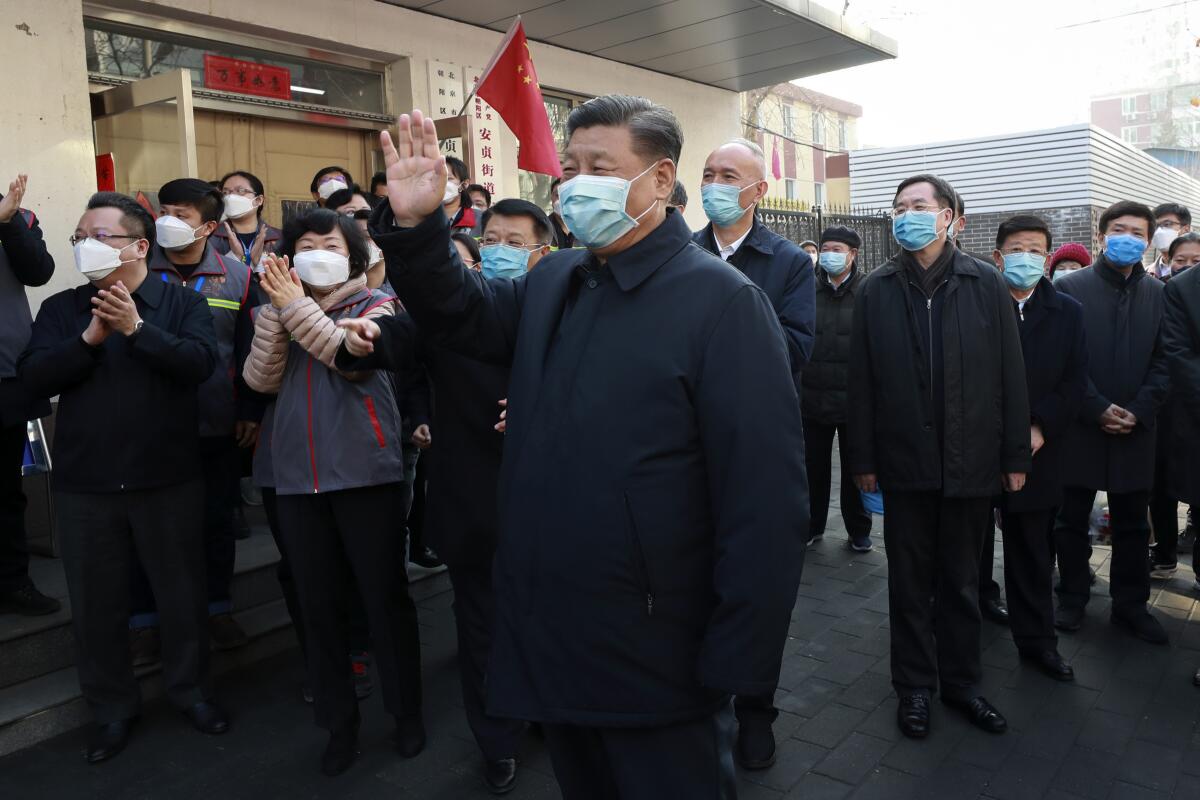
All are driven to declare success and save face by meeting the party’s goals — regardless of whether the reality on the ground matches the rousing rhetoric on state media. It is a strategy meant to instill loyalty and confidence. It was bolstered this week when President Xi Jinping, who has rarely appeared in public since the outbreak in December, visited a local hospital. Wearing a blue surgical mask, he talked to residents and had his temperature taken.
Yanzhong Huang, senior fellow for global health at the Council on Foreign Relations, says the top-down nature of China’s governing system tends to create “unscientific, heavy-handed” approaches to disease prevention and control. “Certainly it is very impressive, mobilizing the entire state and society to achieve an objective,” he said, “but it may not be a scientific approach in terms of finding all the infected cases.”
In Wuhan, the epidemic’s epicenter, authorities launched a weekend campaign to quarantine the infected and find the feverish and those who had close contact with the sick.
Two hospitals had already been built in less than two weeks. And three makeshift “cabin hospitals” had been created in re-purposed gymnasiums and exhibition centers. They were filled with thousands of beds to quarantine confirmed cases with mild symptoms.
Workers also raced to transform hotels, university dormitories and Communist Party schools into quarantine centers. One campus sparked online anger after photos were leaked of workers sweeping students’ personal items out of dormitories and dumping them into mounds of trash outside.
State media published stories about eager neighborhood party workers making 600 phone calls a day to ensure they didn’t miss a single resident, bringing sick people to comfortable quarantine hotels with heating and food, and dispatching medicine to households that needed it.
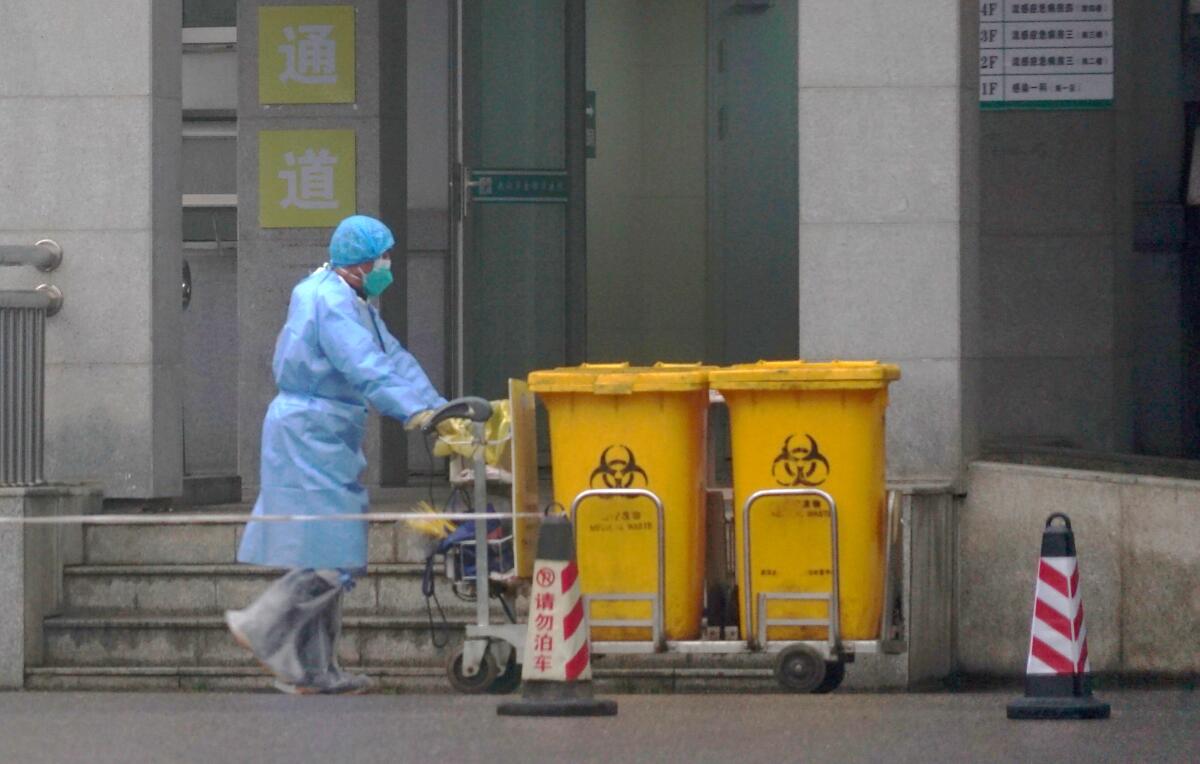
Facts and figures were deployed to meticulous degree. Wuhan’s Communist Party chief Ma Guoqiang said at a news conference Monday that 10.59 million residents, about 98.6% of all households and 99% of the city’s population, had been given health examinations.
It had apparently been done in just five days, just in time for the government’s target date to resume work and revive the frozen Chinese economy. But Chinese cities remained quiet under the quarantines, with few companies operating, and many employees worked from home.
Only 1,499 critical cases of the new coronavirus were found, Ma said, and all were hospitalized by Monday. The city then planned to test all suspected cases of the coronavirus by Tuesday. Not everyone was impressed. Internet users posted tens of thousands of comments on social media about the announcement; many of the users claimed to be Wuhan residents who had not been tested, including some with family members in critical condition.
Referring to the government’s 98.6% health examination figure, a user named Angel wrote: “I’m part of that 1.4%, and looks like all 1,000 residents of our compound are also part of that 1.4%.”
“Are we all Wuhan people on Mars?” wrote another user.
“All these days, no one has checked on us at all, but when I went to take out the trash, there was a sign on our building that said ‘no infections.’ … Did they test us through the air?” wrote user Wang Lu.
A woman in Wuhan named Liu Yao, 30, said in a phone interview that her father, 61, was still under home quarantine despite having had a fever since Jan. 30 and a diagnosis of coronavirus since Feb. 9.
He also had high blood pressure and diabetes. A doctor had told her the neighborhood committee should get him into a hospital. He should have been one of those critical cases already hospitalized, she said, but there was no sign of action despite her repeated calls to the hospital, the neighborhood committee and help hotlines.
“Don’t believe the things they publish online. It’s all lies. Before this happened to my own family, I also believed the news, but the reality is not like this,” Liu said. “If it was, why would we still be fighting to get into the hospitals? Would we make a joke out of our own family members’ lives?”
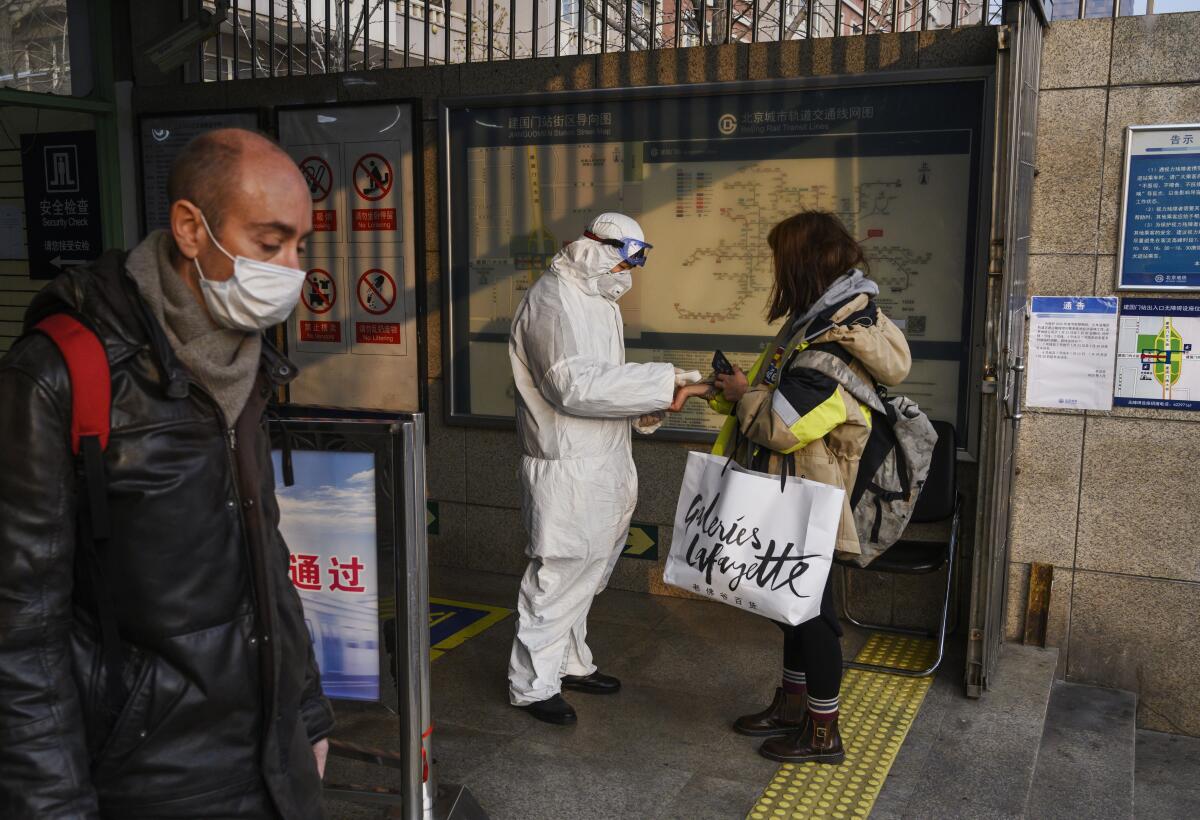
By the government’s mandates, Liu’s entire family should be quarantined. Instead, with everyone in her family afraid of spreading infection, she was attempting to keep her father separate from herself, her sister and mother, and all of them away from her child.
Many of Wuhan’s sick families are still seeking to be tested and quarantined. Yet they wait, staring at walls, hitting dead ends. Liu said: “We are all this 1.4%.”
Other Wuhan residents were reluctant to send their relatives to the new quarantine centers, worried about possible poor conditions — unclean toilets, lack of medical care, and insufficient space between patients’ beds — that could jeopardize their health.
“Those who go to the quarantine center will die faster, especially [in] those gyms and exhibition centers,” Shen Hafeng, who is caring for his sick mother in Wuhan, said in a telephone interview. “They don’t have the appropriate facilities. You sleep surrounded by sick people.... You can only slowly wait to die.”
The monitoring and reporting of residents’ movements have tightened. Cities have clamped down on grocery shopping, with just one person allowed to shop once every two or five days in some neighborhoods, depending on the severity of the outbreak there.
In some areas, no one is allowed to leave home, and neighborhood committees are responsible for delivering food to doorsteps.
In Hangzhou and Haikou, pharmacies have been barred from selling fever and cough medicine, in the hope that those who would have bought those medications will instead report to hospitals. In parts of Beijing, Fujian, Zhejiang and Guangdong, those who buy similar medicines must register and give their personal identification.
A new directive from the prosecutor general’s office makes it a crime punishable by three years in prison, or even death, to conceal one’s virus symptoms and have contact with other people rather than going into quarantine.
Central authorities, meanwhile, have continued to project confidence, blaming local officials for any missteps in epidemic control. President Xi’s surprise visit to the hospital was meant to project the appearance of an all-encompassing father figure leading his nation in a battle against a mysterious illness.
“We will most definitely win this people’s war,” he says in a video of the visit that’s been broadcast hourly on state TV. But that war has both medical and political casualties. Central authorities on Tuesday fired two top health officials in Hubei, the province that includes Wuhan.
Still, the top-down pressure and propaganda persist, with lower-ranking officials trying to defeat a virus while protecting their careers.
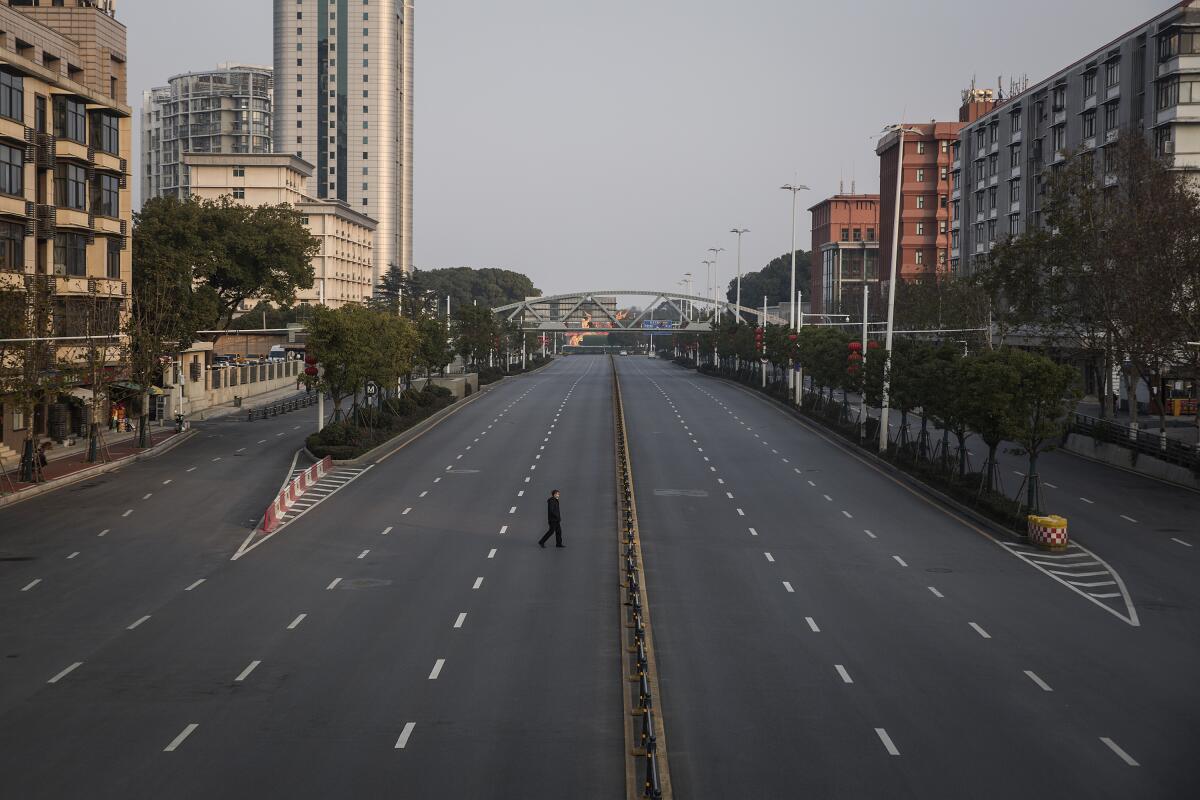
On Monday afternoon, the same day Communist Party chief Ma announced the city’s success in screening and sorting 99% of the population, a 70-year-old man in Wuhan reportedly committed suicide.
His name was Liang Shutao, a resident of Wuhan’s Qiaokou district who had kidney disease, was in need of hemodialysis and was unable to get tested for the coronavirus or get into a hospital.
He jumped off a building just before 3 p.m. Monday, leaving behind his wife, Cheng Xiaolan, 68, who was also infected with the coronavirus but unable to get into a hospital. A 13-second video circulated on social media showed the woman crouched on the ground, wailing, before it was deleted by censors.
Cheng confirmed in a phone call that online reports about her husband were true and that she had since been taken to a hospital. “I’m tired,” she said, declining to speak more.
Her son also confirmed in a phone call the accuracy of the reports but declined to speak to foreign media.
A member of management at Liang’s compound said by phone that “someone did jump off a building” but refused to say more. “I don’t know the details. You have to ask my superiors,” he said.
Gaochao Zhang and Nicole Liu of The Times’ Beijing bureau contributed to this report.
More to Read
Sign up for Essential California
The most important California stories and recommendations in your inbox every morning.
You may occasionally receive promotional content from the Los Angeles Times.

